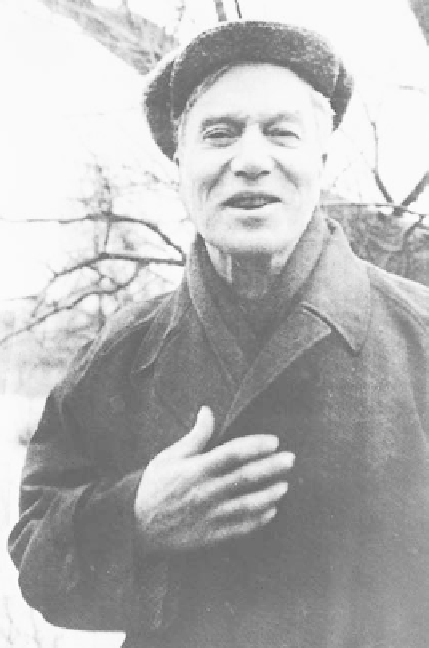Travel Reference
In-Depth Information
Pashukanis was arrested, tried, and executed. Vil-
ified for two decades as an “enemy of the peo-
ple,” Pashukanis was rehabilitated in 1957.
Pasternak, Boris Leonidovich
(1890-1960)
writer
One of the great Russian writers of the 20th cen-
tury, Pasternak became a symbol of the cultural
struggles in the first decade after
STALIN
's death,
when he was pressured to renounce the Nobel
Prize in Literature he received in 1958. Paster-
nak was born in
MOSCOW
to a cultured and well-
connected Jewish family. His father was a
well-known painter and friend of Lev
TOLSTOY
;
his mother was an accomplished pianist. A stu-
dent at the universities of Moscow and Marburg
in Germany, he began to study music but instead
received a diploma in philosophy. Beginning
with his first volume of poetry,
The Twin in the
Clouds,
published in 1914, Pasternak established
himself as a major Russian poet, whose work
was in touch with new modernist currents but
grounded in a philosophical approach to history.
Other volumes such as
Above the Barriers
(1917),
My Sister Life
(1922), and
Themes and Variations
(1923) consolidated his reputation in the early
postrevolutionary period. In
The High Malady,
1905
and
Lieutenant Shmidt,
published between
1924 and 1931, he tried to tackle larger histori-
cal themes, but with less success. After two vol-
umes of poetry in 1931 and 1932, Pasternak's
published output diminished, as Soviet literary
politics enforced the officially approved doctrine
of socialist realism, an area where Pasternak was
found wanting. Criticized for his formalism and
concern with individual matters, only two other
volumes of original poetry were published after
1932. To make a living, he turned to translation,
and his translations of Shakespeare and Goethe,
as well as of other English, German, French,
Armenian, and Georgian writers are considered
to be of the highest standards.
Despite the greatness of his poetry, Paster-
nak's reputation outside of Russia rests primarily
Boris Pasternak, 1958
(Library of Congress)
on
Doctor Zhivago,
his only novel (written
between 1946 and 1956) and the source of the
controversy that surrounded the 1958 Nobel
Prize. In the spirit of the cultural thaw that fol-
lowed Stalin's death in 1953, Pasternak had sub-
mitted his novel, a work that raised important
philosophical and humanistic questions about
the Russian Revolution, to the prestigious liter-
ary journal
Novyi mir,
expecting its publication.
The censors, however, refused to publish it. But
Pasternak had previously given a copy of the
manuscript to an Italian publisher, expecting
that it would be published abroad only after
publication in the Soviet Union. The Italian pub-
lisher went ahead and published the Italian
translation in 1957, and English- and Russian-


Search WWH ::

Custom Search